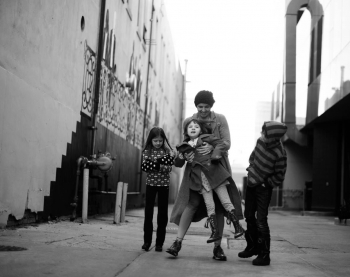By Connor Yearsley
 Charlotte
Figi, the girl who became a symbol of hope for the medical cannabis (Cannabis spp., Cannabaceae) movement,
died on April 7, 2020, after one last seizure. Her short but meaningful life
ended peacefully in the arms of her mother, Paige. She was just 13. Charlotte
Figi, the girl who became a symbol of hope for the medical cannabis (Cannabis spp., Cannabaceae) movement,
died on April 7, 2020, after one last seizure. Her short but meaningful life
ended peacefully in the arms of her mother, Paige. She was just 13.
“Some
journeys are long and bland, and others are short and poignant and meant to
revolutionize the world,” Realm of Caring, a nonprofit organization that Paige
co-founded, posted to its Facebook page in remembrance of Charlotte.
Charlotte
was born on October 18, 2006. After her first seizure at three months old, she
was confirmed to have an SCN1A gene
mutation and diagnosed with Dravet syndrome. This rare, severe, early-onset,
lifelong form of epilepsy causes frequent, difficult-to-control seizures of
multiple types. Seizures associated with Dravet syndrome are among the most
resistant to treatment. In fact, despite trying many medications, Charlotte
eventually experienced more than 300 generalized tonic-clonic seizures per
week. (Formerly
called “grand mal” seizures, tonic-clonic seizures combine the characteristics
of tonic [stiffening] and clonic [rhythmical jerking] seizures. A seizure is
“generalized” if it starts in both sides of the brain.)
Charlotte had significant
cognitive and motor impairments, struggled to walk and talk, and required a
feeding tube and full assistance with daily living. On multiple occasions, she
had to be resuscitated after her heart stopped. “We were told by the
doctor there was nothing left to try pharmaceutically,” Paige was quoted as
saying.1 Charlotte reportedly was not expected to live past age
eight.
Her parents, residents of Colorado,
heard about a parent in California who successfully treated their epileptic
child with medical cannabis. Paige began researching and became interested
in cannabidiol (CBD, a psychoactive but non-intoxicating constituent of
cannabis), which seemed promising for treating seizures. However, physicians
and cannabis industry members discouraged Paige from pursuing medical cannabis
because Charlotte, who was five at the time, reportedly would be the youngest
medical cannabis patient in Colorado.
Undeterred,
Paige found Joel Stanley of Colorado, who, with his six brothers, was breeding
a rare chemovar (chemical variety) of cannabis that is high in CBD and low in
tetrahydrocannabinol (THC, the main psychoactive and intoxicating constituent
of cannabis). The Stanley brothers eventually renamed the chemovar “Charlotte’s
Web” after Charlotte, whose story would emphasize the potential of their plant.
After
receiving permission from physicians and the reluctant state of Colorado, Paige
started giving Charlotte low doses of a sublingual preparation of a Charlotte’s
Web extract and slowly increased the dose. “I didn’t think it was going to
work,” Paige was quoted as saying.1 But, for the first time since Charlotte’s
seizures started, she was seizure-free for seven consecutive days after
starting the cannabis preparation. Twenty months later, she was experiencing
only two or three nocturnal generalized tonic-clonic seizures per month, instead
of one seizure about every 30 minutes before cannabis.
Charlotte
started eating and drinking on her own, sleeping soundly, and walking and
talking. Video clips show her laughing and playing. Cannabis also improved her
autistic behaviors, including aggressiveness, poor eye contact, poor social
interaction, and self-stimulating behavior. She was also able to wean off clobazam,
a benzodiazepine used to treat seizures, which was the only medication she was
taking when she started cannabis. To see if Charlotte’s seizures would recur
without cannabis, Paige weaned her off Charlotte’s Web multiple times, and her
seizures returned each time.
In
2013, Charlotte’s story was spotlighted in CNN’s highly publicized WEED documentary, which helped open
people’s eyes to the potential of medical cannabis and diminish skepticism. After
personally observing how dramatically cannabis improved Charlotte’s quality of
life, CNN medical correspondent Sanjay Gupta, MD, who hosted the documentary,
admitted that he had been wrong, saying that preventing people from accessing
medical cannabis “would not just be a medical failing but a moral failing.”2
According
to The Denver Post,3 after the 2013 documentary, many families,
sometimes referred to as medical cannabis refugees, began migrating to Colorado
to find relief for their afflicted children. Colorado reportedly does not track
how many families move there to treat their children with medical cannabis, but
The Denver Post estimated it to be in
the low hundreds. Many or most of them were motivated and inspired by Charlotte’s
story and other stories and came with hope of having similar success. For these
families, Colorado is a draw because of its large medical cannabis system,
which allows children to be registered patients, and its growing community of
families with children who have various conditions, including cancer, autism, and
Crohn’s disease. However, most, like Charlotte, have severe childhood forms of
epilepsy: Dravet syndrome, Lennox-Gastaut syndrome, or Doose syndrome.
In
2012, Paige co-founded Realm of Caring, which funds and conducts research to
“learn more about cannabis and its effects while legitimizing the therapy,”
according to its website. Charlotte’s story also has helped inspire new medical
cannabis legislation. For example, in 2014, Florida legalized the use of
Charlotte’s Web to treat diseases like epilepsy. In June 2018, the US Food and
Drug Administration (FDA) approved Epidiolex, a pharmaceutically prepared, standardized
oil-based CBD oral solution produced by GW Pharmaceuticals (Carlsbad,
CA/London, UK), for the treatment of seizures associated with Dravet syndrome
and Lennox-Gastaut syndrome, so children like Charlotte can now benefit from a
cannabis-derived prescription medicine with less severe side effects than other
conventional antiseizure medications. Epidiolex is the first drug approved by
the FDA for the treatment of Dravet syndrome and the first cannabis-derived
prescription medicine available in the United States. Also in 2018, CBD
supplements experienced $52.7 million in retail sales in the US natural channel.
Some industry members credit Charlotte’s story with playing a significant role
in CBD’s current popularity.
 In March
2020, the Figi family became ill with what they believe was COVID-19, but they
didn’t meet the requirements to be tested. The rest of the family recovered,
but, on the morning of April 7, Charlotte had a seizure and was taken to the
hospital, where she died surrounded by loved ones. In March
2020, the Figi family became ill with what they believe was COVID-19, but they
didn’t meet the requirements to be tested. The rest of the family recovered,
but, on the morning of April 7, Charlotte had a seizure and was taken to the
hospital, where she died surrounded by loved ones.
“She was divine,” the Stanley brothers wrote of Charlotte
on their website. “She grew, cultivated by a community, protected by love,
demanding that the world witness her suffering so that they might find a
solution. She rose every day, awakening others with her courage, and with that
smile that infected your spirit at the cellular level.”
For Charlotte,
cannabis provided relief like nothing else did and allowed her to do things she
enjoyed, like hiking, tandem biking with her mother, and riding horses with her
twin sister, Chase. Charlotte caused people to pay attention to the potential
of medical cannabis and reconsider the stigma attached to it, but she never
asked to be part of the cannabis conversation. In
fact, she was unaware of it. “She found incredible resolution from cannabis,
but she didn’t know,” Paige was quoted as saying.1 “She had a good
life.”
Charlotte
is survived by her mother, Paige; father, Matt; brother, Max; twin sister,
Chase; and her mother’s husband, Greg Iafeliece. The Figi family asks that any
donations be made to Realm of Caring to continue Charlotte’s legacy. Image credits: All images ©2020 Nichole Montanez. Top: Charlotte Figi
Bottom: Charlotte Figi held by her mother, Paige, with her siblings Chase and Max
References
- Garcia
SE. Charlotte Figi, Who Helped Popularize CBD for Medical Use, Dies at 13. The New York Times. April 9, 2020.
Available at: www.nytimes.com/2020/04/09/us/charlotte-figi-dead.html. Accessed June 29,
2020.
- Charlotte
Figi, the girl who inspired a CBD movement, has died at age 13. YouTube
website. Available at: www.youtube.com/watch?v=JUCaBvF0_YM. Accessed June 29,
2020.
- Ingold
J. Desperate Journey. The Denver Post.
Available at: extras.denverpost.com/stateofhope/#part2. Accessed June 29,
2020.
|